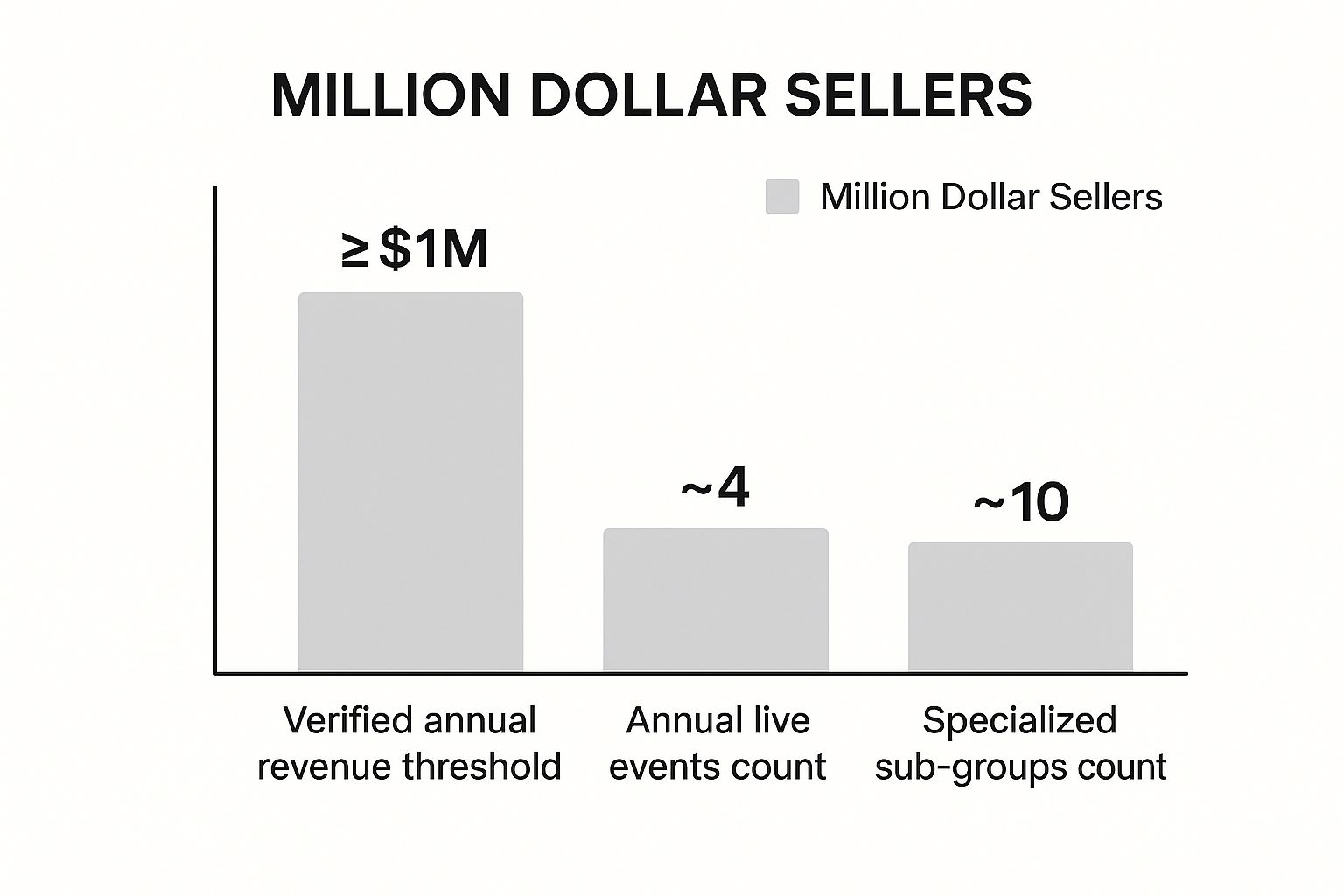Stay Updated with Everything about MDS
Thank you! Your submission has been received!
Oops! Something went wrong while submitting the form.

Chilat Doina
October 21, 2025
For top-tier entrepreneurs, the path eventually forks. One direction leads to actively growing and scaling a business to its absolute peak. The other is all about preserving the wealth you've worked so hard to build. This is the core difference between two elite groups: Tiger 21 and Million Dollar Sellers (MDS).
Tiger 21 is a global community for ultra-high-net-worth folks laser-focused on investment strategy and making their wealth last. On the flip side, Million Dollar Sellers is a tactical mastermind for the best e-commerce operators out there, the ones still in the trenches and dedicated to aggressive business growth.
Your immediate priority—protecting your capital or dominating your market—is the key to figuring out which group is right for you.
Picking between two powerhouse networks like Tiger 21 and MDS isn't about which one is "better." It's about understanding their fundamentally different missions and seeing which one clicks with where you are right now. One is a sanctuary for safeguarding your financial future. The other is a war room for conquering the e-commerce world.

For anyone operating at this level, peer groups are non-negotiable. They're a confidential space to bounce around ideas, get fresh perspectives, and learn from others who've already navigated the same minefields. The right community can shorten your learning curve dramatically, whether you're trying to figure out a nine-figure exit or fine-tune a multi-million dollar ad spend.
The real power is in their focus. You can learn more about how these specialized communities drive success in our guide to growth with business mastermind groups.
First things first: what’s your most pressing need? Are you up at night thinking about asset allocation, estate planning, and how to approach philanthropy? Or is your brain consumed with supply chain logistics, international expansion, and cranking up your e-commerce revenue?
To cut right to the chase, this table lays out the core differences between the two groups. It's a simple snapshot that highlights the fundamental choice you're making: manage your assets or scale your active business.
AttributeTiger 21Million Dollar Sellers (MDS)Primary FocusWealth preservation, investment strategy, legacy planningE-commerce business scaling, operational tacticsIdeal MemberPost-exit founders, UHNW investors, family office heads7- to 9-figure e-commerce founders and operatorsCore BenefitPeer insights on managing and growing personal wealthActionable strategies for immediate business growth
This high-level view sets the stage, making it clear what each group brings to the table before we dive deeper into the specifics.
To really get what Tiger 21 is all about, you have to throw out your typical idea of a business mastermind. This group wasn't built to help entrepreneurs scale their companies. It was created to solve the knotty, complex problems that show up after you’ve already had a massive success. The entire philosophy is built around one thing: the stewardship of significant wealth. That’s a profoundly different game than tactical business growth.
The network was born out of a very specific, personal need. Michael W. Sonnenfeldt founded it back in 1999 after his own major liquidity event. He started with a small, confidential group of just six entrepreneurs in New York who were all trying to figure out how to preserve their wealth—a journey they found surprisingly lonely. Today, that single group has mushroomed into a global network of over 1,550 members across more than 50 cities, with most members holding a minimum of $20 million in investable assets.

This origin story is everything. It defines the group's entire culture. This is a community for people who have already summited their entrepreneurial mountain and are now figuring out how to manage the vast landscape below.
The heart of the Tiger 21 experience is what they call the "Personal Board of Directors." Members are sorted into small, airtight groups of 10-15 peers who meet every single month. These aren't brainstorming sessions for marketing tactics or supply chain logistics; they are rigorous, confidential forums for life and wealth management.
A cornerstone of this model is the Portfolio Defense. It’s exactly what it sounds like. A member lays their entire investment portfolio bare for the group to dissect and critique.
The Portfolio Defense isn’t a gentle conversation. It forces members to justify every investment decision, every asset allocation, and their long-term financial strategy to a room full of people who are just as sharp and successful as they are. This process delivers unfiltered feedback, exposes blind spots, and creates powerful accountability for managing capital responsibly.
This structure demands a level of radical transparency and trust you just don't find elsewhere. It has to, especially when the conversations turn to sensitive topics like family dynamics, estate planning, and philanthropic goals. While other entrepreneur groups are focused on external business challenges, Tiger 21 turns the lens inward, scrutinizing the personal and financial decisions that ultimately shape a member's legacy. It's a fundamental departure from groups like Entrepreneurs' Organization, which you can read more about here: https://milliondollarsellers.com/blog/eo-vs-ypo.
The conversations inside a Tiger 21 meeting are almost always about the long game. The question isn't "How do I make more money?" It’s "How do I protect, grow, and thoughtfully deploy the wealth I’ve already created?" This shifts the dialogue to some incredibly sophisticated financial and personal topics.
You’ll hear deep discussions around:
Central to this entire philosophy is creating a robust, self-sustaining portfolio. For many high-net-worth individuals like those in Tiger 21, this involves implementing smart strategies for generating passive income online. This intense focus on capital stewardship—moving from active income generation to sophisticated wealth management—is what truly sets it apart from any business-scaling mastermind out there.
Leaving the world of wealth preservation behind, we now step onto the active battlefield of e-commerce with Million Dollar Sellers (MDS). If Tiger 21 is about protecting your castle, MDS is the war room where generals plot their next campaign. It’s a mastermind built for entrepreneurs who are in the thick of scaling their multi-million dollar online businesses.
MDS was born from a simple need: sharing what’s working right now to grow an e-commerce brand. The whole community is laser-focused on solving the urgent, high-stakes problems that pop up when you're trying to push a business from seven to eight, or even nine figures. Think of it as a tactical command center, with a heavy emphasis on the Amazon marketplace. It’s a group for operators, by operators.
The entire structure is built for speed and immediate application. It’s a dynamic mix of events, forums, and focused groups designed to keep members on the bleeding edge of e-commerce.
The real magic of MDS is its incredibly practical, "in-the-trenches" vibe. Members aren't debating abstract theories; they're sharing the results of a split test they just finished or a new logistics hack that's saving them thousands. It creates this powerful ecosystem of real-time problem-solving and opportunity-grabbing.

This breakdown shows a group clearly geared towards active scaling—from its more accessible revenue requirement to its frequent, strategy-heavy events and niche support groups. It immediately signals that this is a place for serious, high-volume e-commerce sellers looking for a competitive advantage. If you want to dive deeper into how these kinds of high-level groups operate, you can explore the concept of a Million Dollar Mastermind.
The community is much more than just a message board. It's a full-blown support system designed to help elite sellers connect and collaborate in whatever way works best for them.
Here are the key pillars of the MDS experience:
This setup means that whether you're wrestling with German VAT registration or trying to perfect a product launch sequence, there’s a dedicated space full of genuine experts who have been there and are ready to help. You can get a better sense of their collaborative approach by reading about the MDS collaboration with Carbon6.
The core difference comes down to urgency and application. A Tiger 21 member might spend a meeting defending their private equity allocation. An MDS member is more likely to be sharing a split-test result that just boosted their conversion rate by 15%. It's all about immediate, measurable impact on an active business.
Getting in requires proof. Membership is contingent on verified annual revenue, which typically starts at $1 million. This strict vetting ensures everyone in the room is a proven operator, which is what keeps the quality of shared knowledge so incredibly high.
While both Tiger 21 and Million Dollar Sellers (MDS) are elite communities for successful entrepreneurs, they operate in completely different universes. It’s not about which one is better; it’s about understanding they serve two distinct stages of an entrepreneur’s life. One is a think tank for preserving wealth, while the other is a war room for scaling a business.
Getting this distinction right is the most crucial step you'll take. The entire vibe—from the conversations to the meeting agendas—stems from these fundamentally opposing missions.
At its heart, Tiger 21 is all about wealth stewardship. The big question members wrestle with isn't "How do I make more money?" but rather, "How do I responsibly manage, preserve, and grow the massive nest egg I've already built?" This philosophy shapes everything, from their confidential meeting formats to their intense focus on legacy planning.
MDS, on the other hand, is laser-focused on tactical business scaling. These are operators deep in the e-commerce trenches, obsessed with immediate, measurable growth. Their driving question is, "What can I do this week to boost revenue, expand margins, and steal market share?" It’s an environment crackling with urgency and a bias for action.
The philosophical divide is stark: Tiger 21 is for when you're ready to shift from actively earning to strategically managing capital. MDS is for when you're ready to double down on earning by blowing up your high-growth business.
This core difference defines the entire experience. A Tiger 21 member might be dissecting their asset allocation or philanthropic strategy. An MDS member is in the weeds, trying to crush their latest PPC campaign or lock in better terms with a supplier.
The topics on the table in any given meeting tell you everything you need to know. If you were a fly on the wall, the contrast would be almost comical.
Inside a Tiger 21 Meeting, you’d likely hear about:
Meanwhile, an MDS meeting is a whirlwind of tactical, in-the-trenches topics:
It’s a tale of two completely different worlds. One is playing the long game of macro-level wealth management. The other is executing at the micro-level to build that wealth in the first place.
To make this even clearer, let's break down the key differences side-by-side.
FeatureTiger 21Million Dollar Sellers (MDS)Typical Member ProfileUltra-high-net-worth individual, often post-exit or nearing it. Focused on capital preservation.Active 7-9 figure e-commerce operator. Focused on aggressive business growth.Primary Discussion TopicsInvestment strategies, asset allocation, estate planning, philanthropy, legacy.PPC/ad strategies, supply chain, new marketplaces, conversion optimization, team building.Meeting Structure & VibeFormal, highly structured "Portfolio Defense." Deliberate, confidential, and introspective.High-energy, rapid-fire idea exchange. Action-oriented, collaborative, and tactical.Core Goal for MembersTo become a better steward of existing wealth and make sound, long-term financial decisions.To gain immediately actionable strategies to scale revenue and profitability.Expected OutcomeA refined, peer-vetted strategy for managing personal wealth for generations to come.A notebook full of tactics and new connections to implement in the business the next day.
This table lays it all out. Your goals will immediately point you to the right column.
The meeting structures are purpose-built for their goals. The famous Tiger 21 "Personal Board of Directors" model is designed for deep, personal reflection. Its centerpiece, the Portfolio Defense, is a formal, almost clinical process where your entire financial life is put under a microscope. It’s a powerful format for fostering the accountability and vulnerability needed to make decisions that will echo for generations.
MDS meetings, whether at live events or in digital forums, are built for speed. The format is often a rapid-fire round-robin of "what's working now." A member can bring up a specific business challenge and get a dozen proven solutions in minutes from peers who have already been there and done that. It’s pure, collaborative energy designed to arm you with tactics you can use the moment you walk out the door.
You can see Tiger 21’s long-term, cautious approach reflected in their members' investment trends. For instance, allocations to hedge funds have plummeted from 12% to just 2% over the last 16 years. Instead, private equity and real estate have taken over, now making up 29% and 27% of portfolios. It’s a clear shift toward tangible, direct investments, a topic you can read more about in their analysis of the end of an era for hedge funds within this elite group.
So, how do you actually choose between Tiger 21 and Million Dollar Sellers? It’s less about which group has a better feature list and more about where you are on your entrepreneurial journey. Your current business stage, what you want out of your personal finances, and the problems keeping you up at night will point you in the right direction.
To make this tangible, let's break it down into three distinct entrepreneur profiles. Find the one that feels most like you right now. This isn't just a thought exercise; it's a practical way to figure out where you'll get the most bang for your buck.

Picture this: you just sold your e-commerce brand for a life-changing amount of money. The daily operational grind is over, but now you're facing a much bigger, more complex challenge—what to do with all this capital. Your focus has flipped from building a business to building a legacy.
This is the classic Tiger 21 member. Your conversations are no longer about conversion rates or ad spend; they’re about asset allocation for multi-generational wealth. You need a trusted circle of peers who genuinely understand the pressures and opportunities that come with a massive liquidity event.
Your biggest headaches now are:
For the Post-Exit Founder, the choice is obvious. MDS would feel like taking a step back, focusing on operational problems you’ve already solved. Tiger 21 is built to provide the forward-looking financial and personal guidance you need now.
Now, let's switch gears. You're the founder of an e-commerce brand that's absolutely exploding. You’re in the middle of scaling from $10M to $50M in revenue, and you are deep in the trenches. Every single day brings a new, high-stakes fire to put out. Your world revolves around supply chains, international expansion, and staying one step ahead of the competition.
This entrepreneur is a perfect fit for Million Dollar Sellers. The idea of discussing estate planning sounds like a far-off dream. What you need is tactical, actionable advice from people fighting the exact same battles, right now.
The Hyper-Growth Operator doesn't need a "Personal Board of Directors" for their life; they need a special forces unit for their business. They need immediate, field-tested intel on marketing, logistics, and team building to keep their rocket ship from blowing up.
MDS delivers this in spades. Joining Tiger 21 at this stage would be a total mismatch of priorities. The discussions would feel abstract and completely disconnected from the daily operational warfare you're waging. Your people are other operators, not wealth managers.
Finally, let's look at the entrepreneur who’s somewhere in the middle. You're running a mature, consistently profitable e-commerce business—let's say in the $5M - $15M range. It doesn't need your constant, hands-on attention anymore because you've built a solid team. While you're still involved, you're starting to dedicate more brainpower to your long-term wealth strategy.
This is where the decision gets a bit more nuanced. You have one foot in operations and the other stepping into the world of asset management.
Here’s how to think about it:
For the Diversified Entrepreneur, it all comes down to an honest self-assessment of where your focus truly lies. The choice between these two powerhouses depends on whether your biggest challenges are still inside your business, or if they’ve started to spill over onto your personal balance sheet.
When you’re staring down two elite groups like Tiger 21 and Million Dollar Sellers, the final call isn’t about which one is “better.” It’s about a brutally honest assessment of where you are right now.
Both networks are powerhouses, but they solve completely different problems for entrepreneurs at very distinct points in their journey. One is for the grind of building, the other is for the art of preservation. Figuring out which side of that line you’re on is everything. This isn't just about picking a group; it's about choosing the right toolkit for the job at hand.
Let's cut through the noise. When you strip everything else away, the choice comes down to two very different missions.
Million Dollar Sellers is a war room for active e-commerce operators. Full stop. Its entire reason for being is to give you the tactical playbook, peer support, and intel you need to scale an online business aggressively. MDS is the arena for founders who are still in the trenches, focused on one thing: growing the top line.
On the flip side, Tiger 21 is a sanctuary for wealth and life management. It’s built for people who have already had a major liquidity event and are now facing a new set of challenges. The conversations shift dramatically from making money to managing it—preserving capital, navigating complex investments, and building a legacy.
The real question is one of timing. Are you still building the engine, or have you built it and now need to learn how to fly the jet? Your answer points you directly to the right door.
To make this crystal clear, run through these questions. Your gut answers will tell you exactly where you belong today.
Working through these points moves you past a simple feature list and toward a strategic decision. You want to join the community that aligns perfectly with your most urgent needs today, because that's the group that will help you get where you want to go tomorrow.
When you're looking at elite groups like Tiger 21 and Million Dollar Sellers, a few practical questions always come up. Before you even think about applying, you need straight answers on the cost, the time sink, and whether you can (or should) join both. Let's break it down.
The membership fees for these groups are worlds apart, and for good reason—they’re built for entirely different purposes.
With Tiger 21, you're making a serious investment. The annual dues are reportedly around $30,000. That price tag gets you into their meticulously curated monthly meetings, gives you a "Personal Board of Directors," and connects you to a global network of ultra-high-net-worth individuals. Think of it less as a business expense and more as a strategic cost for managing a massive asset portfolio.
Million Dollar Sellers is positioned differently. While it’s still an exclusive, high-level group, the investment is designed to deliver a direct ROI on your active business. It’s a performance-based expense—you join to get actionable strategies that grow your top and bottom line, not to manage your wealth.
Both groups expect you to show up and be present, but how you spend that time is completely different.
Absolutely. For a certain type of entrepreneur, being a member of both isn't just possible—it's the perfect strategy.
If you're still actively scaling a large e-commerce business but have also built a substantial investment portfolio on the side, a dual membership makes a ton of sense.
Think of it this way: MDS is for the here-and-now of your business—the tactical, in-the-trenches advice you need to grow. Tiger 21 is for what comes next—preserving and growing the wealth you're generating from that business.
This approach is ideal for the "Diversified Entrepreneur" who still has their hands on the operational levers but also needs a sophisticated sounding board for their larger financial picture. You get the best of both worlds: growth execution and wealth preservation.
At Million Dollar Sellers, we're focused on one thing: giving you the actionable strategies and elite peer network to scale your e-commerce business past seven, eight, and even nine figures. If aggressive growth and operational mastery are your priorities, see if you’re a fit for our community. Learn more and apply to Million Dollar Sellers.
Join the Ecom Entrepreneur Community for Vetted 7-9 Figure Ecommerce Founders
Learn MoreYou may also like:
Learn more about our special events!
Check Events